The American Society of Human Genetics Comes to Town!
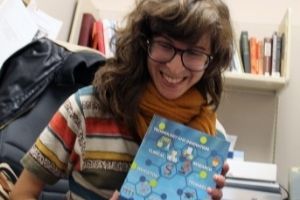
A blog post by Assistant Curator Dr. Alicia Puglionesi. To read more posts about our Beyond Chicken Soup exhibit click HERE.
Baltimore’s downtown was filled with more doctors than usual last week, as the American Society of Human Genetics (ASHG) held its annual meeting at the Convention Center. Though I’m not a real doctor, I dropped in to do some on-the-ground research for the “laboratory” section of the JMM’s upcoming exhibit, Beyond Chicken Soup: Jews and Medicine in America. Most of the attendees were laboratory scientists who study the genome. Some look for markers of future illness, while others use genes to piece together the history of human populations, both topics that we’ll touch on in the exhibit.
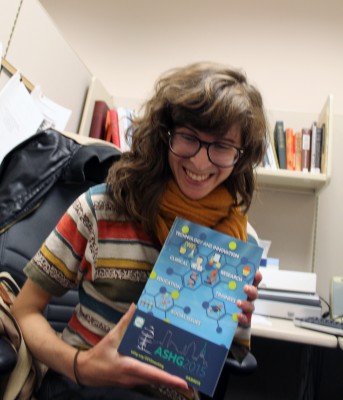
Translating basic scientific research into medical applications used to be a slow process, but in genetics it’s become almost instantaneous: studies reveal a gene linked to a disease, and screening providers add the new marker to their massive and growing catalogues of potential maladies. On the surface this seems like a great development, but medicine is still figuring out how to understand and act on genetic risk.
Part of the ASHG meeting was an enormous expo of genetic technology companies, from big names like Affymetrix to garage start-ups. Roaming the booths to collect contemporary genetics ephemera, I was intrigued by the variety of services on offer. There’s big money in biotech, but who’s making sure that these innovations actually help patients?
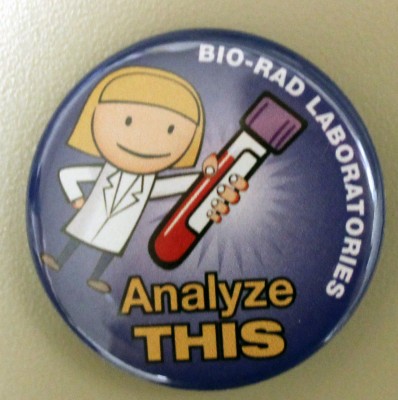
The ASHG also includes genetic counselors and bioethicists whose job it is to integrate new technologies into medical practice with respect to patients’ rights and social values. I spoke with one clinician, Dr. Sophia Hufnagel, who specializes in pediatric genetics; she works with children and their families to make sure that they understand and consent to testing, and helps them interpret the results. Her research explores how young people feel about the ethical questions that their elders sometimes try to protect them from.
The teenagers who Dr. Hufnagel surveyed didn’t want to be shielded from the results of genetic testing (at least in a hypothetical scenario). Many said that knowledge of an inherited risk “would help them plan for the future,” or even lead to scientific research that might produce better treatment. Hufnagel observed that many adolescents “have adequate decision-making capacities” and could be granted more agency in their own medical treatment. From a clinical perspective, though, it’s impossible to make hard-and-fast rules. “I’m a huge advocate for partnership” with patients and families, Hufnagel explained. “Everything has to be case-by-case.”
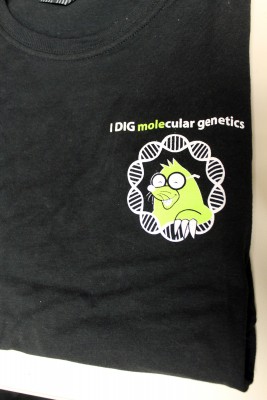
This notion of “partnership” kept popping up in my perambulations through the convention center. Interestingly, it got lots of play in the technology expo, where company reps described their approach as “partnering” with physicians, patients, and genetic counselors. This seemed to reflect the professional norms of bioethics that Hufnagel described. At the same time, there’s a different logic at work for corporations that sell genetic testing services. Their profit and competitive advantage comes, in part, from creating the desire to know everything one possibly can rather than protecting “the right not to know” that Hufnagel carefully defends for her patients. This desire plays on popular perceptions of scientific authority and genetic determinism that don’t capture the complexity and uncertainty of current medical genetics.
This new industry is still forming – the FDA intervened in 2013 to halt direct-to-consumer (DTC) sales of medical genetic tests by the company 23andMe, mandating that physicians request such testing. Just this year, the agency changed course and approved 23andMe’s DTC test for Bloom Syndrome, opening the gates for companies to market over-the-counter screening products for a wide range of diseases. FDA administrator Alberto Gutierrez said that Americans should have “direct access to their personal genetic information… [which] supports innovation and will ultimately benefit consumers.” I met a lot of people who will benefit from this ruling, prowling among pipette displays and novelty pens at the ASHG expo. But the implications for consumers seem far more ambiguous.

As part of our preparations for Beyond Chicken Soup, I and curator Karen Falk have been sketching out interactive ethical scenarios for museum visitors rather like the one that Dr. Hufnagel posed to her study subjects: would you want to know the results of a genetic test if it could reveal an untreatable condition in your future? The goal isn’t to get a “right” answer, but rather, as Hufnagel underscored, to reflect on your personal priorities: what level of knowledge would you feel comfortable with? Hufnagel’s work brings out an important dimension to these questions: when would you want to know? “The big worry [with teens],” she explains, “is that they can’t unknow it – they have that knowledge for the rest of their life.”
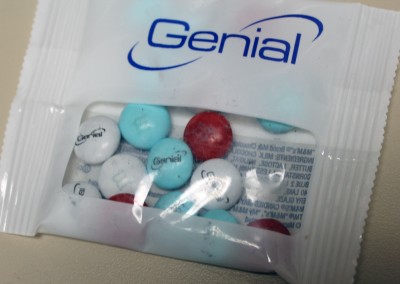
Questions of how well people understand risk, how much they want to know, and what technology can really tell us will only get more complicated as the biotech industry flexes its muscle and scientists burrow deeper into the genome. Look out for the genetics section of Beyond Chicken Soup, where we explore the history of genetic screening in the Jewish community and the directions it’s taking today.
